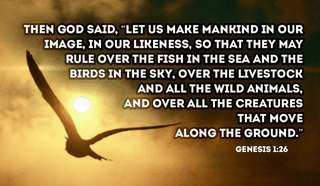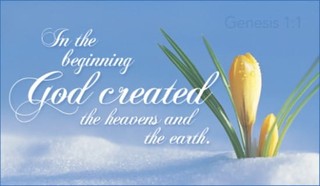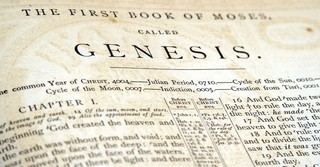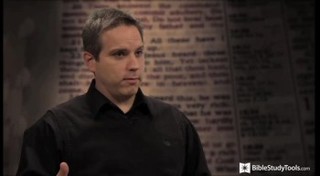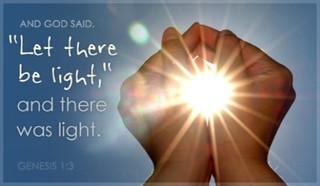
- Recent Translations
- All Translations
Genesis 1
Share
Settings
Genesis 1 Commentary
Chapter 1
Genesis is a name taken from the Greek, and signifies "the book of generation or production;" it is properly so called, as containing an account of the origin of all things. There is no other history so old. There is nothing in the most ancient book which exists that contradicts it; while many things recorded by the oldest heathen writers, or to be traced in the customs of different nations, confirm what is related in the book of Genesis.
God creates heaven and earth. (1,2) The creation of light. (3-5) God separates the earth from the waters, and makes it fruitful. (6-13) God forms the sun, moon, and stars. (14-19) Animals created. (20-25) Man created in the image of God. (26-28) Food appointed. (29,30) The work of creation ended and approved. (31)
Verses 1-2 The first verse of the Bible gives us a satisfying and useful account of the origin of the earth and the heavens. The faith of humble Christians understands this better than the fancy of the most learned men. From what we see of heaven and earth, we learn the power of the great Creator. And let our make and place as men, remind us of our duty as Christians, always to keep heaven in our eye, and the earth under our feet. The Son of God, one with the Father, was with him when he made the world; nay, we are often told that the world was made by him, and nothing was made without him. Oh, what high thoughts should there be in our minds, of that great God whom we worship, and of that great Mediator in whose name we pray! And here, at the beginning of the sacred volume, we read of that Divine Spirit, whose work upon the heart of man is so often mentioned in other parts of the Bible. Observe, that at first there was nothing desirable to be seen, for the world was without form, and void; it was confusion, and emptiness. In like manner the work of grace in the soul is a new creation: and in a graceless soul, one that is not born again, there is disorder, confusion, and every evil work: it is empty of all good, for it is without God; it is dark, it is darkness itself: this is our condition by nature, till Almighty grace works a change in us.
Verses 3-5 God said, Let there be light; he willed it, and at once there was light. Oh, the power of the word of God! And in the new creation, the first thing that is wrought in the soul is light: the blessed Spirit works upon the will and affections by enlightening the understanding. Those who by sin were darkness, by grace become light in the Lord. Darkness would have been always upon fallen man, if the Son of God had not come and given ( 1 John. 5:20 ) approved of. God divided the light from the darkness; for what fellowship has light with darkness? In heaven there is perfect light, and no darkness at all; in hell, utter darkness, and no gleam of light. The day and the night are the Lord's; let us use both to his honour, by working for him every day, and resting in him every night, meditating in his law both day and night.
Verses 6-13 The earth was emptiness, but by a word spoken, it became full of God's riches, and his they are still. Though the use of them is allowed to man, they are from God, and to his service and honour they must be used. The earth, at his command, brings forth grass, herbs, and fruits. God must have the glory of all the benefit we receive from the produce of the earth. If we have, through grace, an interest in Him who is the Fountain, we may rejoice in him when the streams of temporal mercies are dried up.
Verses 14-19 In the fourth day's work, the creation of the sun, moon, and stars is accounted for. All these are the works of God. The stars are spoken of as they appear to our eyes, without telling their number, nature, place, size, or motions; for the Scriptures were written, not to gratify curiosity, or make us astronomers, but to lead us to God, and make us saints. The lights of heaven are made to serve him; they do it faithfully, and shine in their season without fail. We are set as lights in this world to serve God; but do we in like manner answer the end of our creation? We do not: our light does not shine before God, as his lights shine before us. We burn our Master's candles, but do not mind our Master's work.
Verses 20-25 God commanded the fish and fowl to be produced. This command he himself executed. Insects, which are more numerous than the birds and beasts, and as curious, seem to have been part of this day's work. The Creator's wisdom and power are to be admired as much in an ant as in an elephant. The power of God's providence preserves all things, and fruitfulness is the effect of his blessing.
Verses 26-28 Man was made last of all the creatures: this was both an honour and a favour to him. Yet man was made the same day that the beasts were; his body was made of the same earth with theirs; and while he is in the body, he inhabits the same earth with them. God forbid that by indulging the body, and the desires of it, we should make ourselves like the beasts that perish! Man was to be a creature different from all that had been hitherto made. Flesh and spirit, heaven and earth, must be put together in him. God said, "Let us make man." Man, when he was made, was to glorify the Father, Son, and Holy Ghost. Into that great name we are baptized, for to that great name we owe our being. It is the soul of man that especially bears God's image. Man was made upright, ( Ecclesiastes 7:29 ) . His understanding saw Divine things clearly and truly; there were no errors or mistakes in his knowledge; his will consented at once, and in all things, to the will of God. His affections were all regular, and he had no bad appetites or passions. His thoughts were easily brought and fixed to the best subjects. Thus holy, thus happy, were our first parents in having the image of God upon them. But how is this image of God upon man defaced! May the Lord renew it upon our souls by his grace!
Verses 29-30 Herbs and fruits must be man's food, including corn, and all the products of the earth. Let God's people cast their care upon him, and not be troubled about what they shall eat, and what they shall drink. He that feeds his birds will not starve his babes.
Verse 31 When we come to think about our works, we find, to our shame, that much has been very bad; but when God saw his work, all was very good. Good, for it was all just as the Creator would have it to be. All his works, in all places of his dominion, bless him; and therefore, bless thou the Lord, O my soul. Let us bless God for the gospel of Christ, and when we consider his almighty power, let us sinners flee from the wrath to come. If new-created unto the image of God in holiness, we shall at length enter the "new heavens and new earth, wherein dwelleth righteousness."
Genesis 1 Commentaries
Chapter Summary
INTRODUCTION TO GENESIS
This book, in the Hebrew copies of the Bible, and by the Jewish writers, is generally called Bereshith, which signifies "in the beginning", being the first word of it; as the other four books of Moses are also called from their initial words. In the Syriac and Arabic versions, the title of this book is "The Book of the Creation", because it begins with an account of the creation of all things; and is such an account, and so good an one, as is not to be met with anywhere else: the Greek version calls it Genesis, and so we and other versions from thence; and that because it treats of the generation of all things, of the heavens, and the earth, and all that are in them, and of the genealogy of men: it treats of the first men, of the patriarchs before the flood, and after it to the times of Joseph. It is called the "first" book of Moses, because there are four more that follow; the name the Jewish Rabbins give to the whole is hrwt yvmwx hvmx, "the five fifths of the law", to which the Greek word "pentateuch" answers; by which we commonly call these books, they being but one volume, consisting of five parts, of which this is the first. And that they were all written by Moses is generally believed by Jews and Christians. Some atheistical persons have suggested the contrary; our countryman Hobbes {a} would have it, that these books are called his, not from his being the author of them, but from his being the subject of them; not because they were written by him, but because they treat of him: but certain it is that Moses both wrote them, and was read, as he was in the Jewish synagogues, every sabbath day, which can relate to no other writings but these, Joh 1:45-47, Ac 15:21. And Spinosa, catching at some doubts raised by Aben Ezra on De 1:1 concerning some passages which seemed to him to have been added by another hand, forms objections against Moses being the author of the book of Genesis; which are sufficiently answered by Carpzovius {b}. Nor can Ezra be the author of the Pentateuch, as Spinosa suspects; since it is plain these writings were in being before his time, in the times of Josiah, Amaziah, yea, of David, and also of Joshua, 2Ch 34:14 \2Ch 25:4 1Ki 2:3 Jos 8:34\ nay, they are even referred to in the book of Ezra as the writings of Moses, Ezr 3:2, 6:18 to which may be added, in proof of the same, De 31:9,24. Nor are there any other writings of his authentic; what are ascribed to him, as the Analepsis of Moses, his Apocalypse, and his Last Will and Testament, are apocryphal. That this book of Genesis particularly was written by him, is evident from the testimony of Philip, and even of our Lord Jesus Christ, who both testify that he wrote concerning the Messiah, Joh 1:45, 5:46 as he did in this book, where he speaks of him as the seed of the woman that should break the serpent's head; as the seed of Abraham, in whom all the nations of the earth should be blessed; and as the Shiloh, to whom the gathering of the people should be, \Ge 3:15 22:18 49:10\. Nor is there any reason to believe that he wrote this book from the annals of the patriarchs, since it does not appear, nor is it very probable, that they had any; nor from traditions delivered down from one to another, from father to son, which is more probable, considering the length of the lives of the patriarchs: but yet such a variety of particulars respecting times, places, persons, their genealogies and circumstances, so nicely and exactly given, can scarcely be thought to be the fruit of memory; and much less is it to be imagined that he was assisted in it by Gabriel, when he lived in solitude in Midian: but it is best of all to ascribe it to divine inspiration, as all Scripture is by the apostle, 2Ti 3:16 for who else but God could have informed him of the creation, and the manner and order in which every creature was brought into being, with a multitude of things recorded in this book? the design of which is to lead men into the knowledge and worship of the one true God, the Creator of all things, and of the origin of mankind, the fall of our first parents, and their posterity in them; and to point at the means and method of the recovery of man by the Messiah, the promised seed; and to give an account of the state and case of the church of God, in the times of the patriarchs, both before and after the flood, from Adam, in the line of Seth, to Noah; and from Noah to the times of Joseph, in whose death it ends: and, according to Usher {c}, it contains an history of two thousand, three hundred, and sixty nine years.
{a} Leviath. par. 3. c. 33. {b} Introduct. ad Libr. Bib. V. T. c. 4. sect. 2. {c} Annal. Vet. Test. p. 17.
\\INTRODUCTION TO GENESIS 1\\
This chapter contains an account of the creation of the universe, and all things in it; asserts the creation of the heaven and earth in general, and describes the state and condition of the earth in its first production, Ge 1:1-2 and then proceeds to declare the work of each of the six days of creation, and to give an account of light, its separation from darkness and the names of both, the work of the first day, Ge 1:3-5 of the firmament, its use and name, the work of the second day, Ge 1:6-8 of the appearance of the earth, and the production of grass, herbs, and trees in the earth, the work of the third day, Ge 1:9-13 of the sun, moon, and stars, their situation, and use, the work of the fourth day, Ge 1:14-19 of the fowls of the air, and the fishes of the sea, the work of the fifth day, Ge 1:19-23 of all kinds of cattle, and beasts, and creeping things, Ge 1:24-25 and then of man, created male and female, after the image of God, having a grant of dominion over the rest of the creatures, the fruit of divine consultation, Ge 1:26-28 and of a provision of food for man and beast, Ge 1:29-30. And the chapter is concluded with a survey God took of all his works, and his approbation of them; all which were the work of the sixth day, and closes the account of the creation in that space of time, Ge 1:31.
